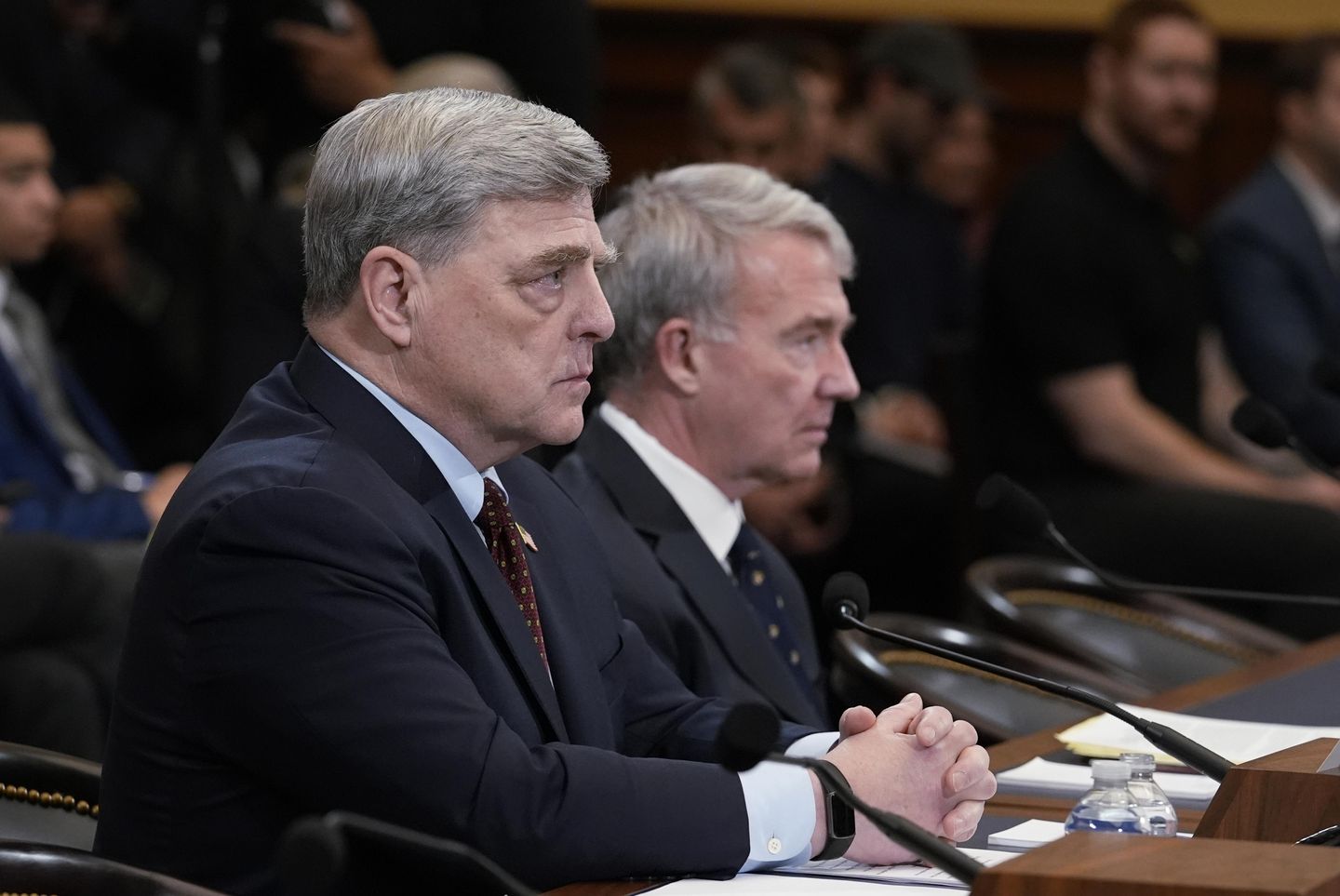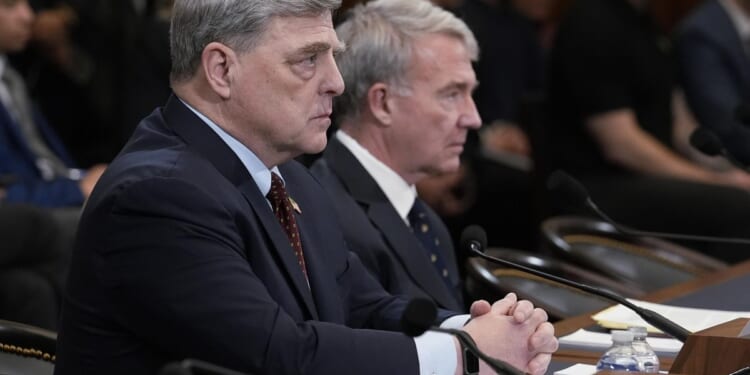
A delayed State Department decision on withdrawing U.S. citizens was a key factor in the chaotic and bloody final days of the U.S. combat mission in Afghanistan, former Joint Chiefs of Staff head Gen. Mark A. Milley said Tuesday, contributing to the vulnerability that left 13 U.S. service personnel and some 170 Afghans dead after a terrorist bombing at Kabul’s international airport in August 2021.
Gen. Milley, now retired and testifying for the first time as a civilian on the Biden administration’s handling of the closing days of the war, told the House Foreign Affairs Committee that a complex tangle of political and military decisions led to the tragic end of the 20-year mission in Afghanistan.
“The fundamental mistake, the fundamental flaw, was the timing of the State Department. It was too slow and too late,” Gen. Milley said.
“The outcome of Afghanistan was the result of many decisions from many years of war,” he said. “Like any complex phenomena, there was no single causal factor that determined the outcome.”
Gen. Milley and retired Marine Corps Gen. Kenneth F. McKenzie, who commanded U.S. Central Command from 2019 to 2022, said political considerations overrode their recommendation that a small U.S. military contingent stay in the country while the Taliban movement was toppling the U.S.-backed government in Kabul. They said President Biden operated within his authority as commander in chief in making the decision to pull out.
Gen. McKenzie did not dodge his own responsibility regarding the suicide bombing that stamped a grim endpoint on the U.S. mission.
“I was the overall commander, and I and I alone bear full military responsibility for what happened at Abbey Gate,” Gen. McKenzie said.
“Responsibility does not lie with the troops on the ground, who performed magnificently,” he said. “The simple fact is this: On the battlefield, even with good planning and tremendous execution by great people on the ground, the enemy sometimes has success. To ignore this fact is to ignore the fundamental reality of the battlefield.”
Family members of service members killed in the Abbey Gate attack attended the hearing. Their loved ones were manning the entryway at Kabul’s Hamid Karzai International Airport to help control the crowds of Afghans attempting to flee the country.
The final months of the U.S. mission in Afghanistan and Mr. Biden’s decision to pull out all American troops have been continuing sources of partisan clashes on Capitol Hill. Mr. Biden’s personal popularity ratings took a sharp hit in the aftermath of the Taliban victory and have never fully recovered.
As they have testified before, the generals said they recommended keeping a residual force of about 2,500 U.S. troops in Afghanistan, in part to maintain control of the vast U.S. military air base at Bagram. Mr. Biden opted for a smaller force tasked with protecting the U.S. Embassy and personnel, leading to the Taliban’s quick seizure of Bagram and forcing the evacuation to go through the overwhelmed, less-secure Kabul civilian airport.
Republican critics say the precipitous and total withdrawal led to the airport tragedy and a geopolitical defeat that damaged U.S. interests around the world. Democrats counter that Mr. Biden’s hands were largely tied by an agreement with the Taliban made under President Trump that would bring home the U.S. troops.
Republicans say congressional Democrats failed to press the White House and Pentagon hard enough when they held the majority in the House. When Republicans took control after the 2022 midterm elections, the Afghanistan withdrawal became a prime focus for oversight.
“As the withdrawal date neared, the situation in Afghanistan deteriorated as the Taliban gained significant ground across the country,” said House Foreign Affairs Committee Chairman Michael McCaul, Texas Republican.
“Yet the Biden administration failed to plan for their withdrawal, threatening the safety and security of U.S. personnel still in the country …,” Mr. McCaul said. “The State Department did not even request an emergency evacuation until after Kabul was surrounded by the Taliban.”
Rep. Gregory Meeks of New York, the ranking Democrat on the House Foreign Affairs Committee, said Mr. Biden made the right call to pull American troops out of Afghanistan despite the short-term consequences.
“If we’re taking a serious look at this, you just can’t take a peek at one little segment of it and say, ‘This is the reason everything happened,’” he said.
Botching the evacuation
Much of the hearing focused on the rushed and confusing process to evacuate thousands of U.S. personnel and Afghans who assisted the international military and aid effort. The debate deepened as Taliban forces made stunning gains in the summer of 2021 and rapidly approached the outskirts of Kabul.
The retired generals said the State Department failed to pull the trigger on a pullout of U.S. citizens in Afghanistan until it was too late. It was the most pointed public criticism to date from former Defense Department officials who were tasked with carrying out the noncombatant evacuation operation, or NEO.
The U.S. Embassy in Kabul had a list of all the registered Americans living in Afghanistan, but military officials weren’t granted access when it could have helped. U.S. officials were also balancing the need to get people out with the fear that signs of a hasty withdrawal would undermine the Afghan government even more.
“We struggled to gain access to that plan and work with them over the month of July until we finally got a decision to execute the NEO,” Gen. McKenzie said. “We worked with the embassy before then, but we didn’t have authority to move out and do the things you have to do to make a NEO happen until the 14th of August. We were in extremis at that point.”
Gen. Milley said the consensus among U.S. military officials, including Defense Secretary Lloyd Austin, was that U.S. Embassy personnel and the remaining military troops should leave Afghanistan.
“After the decision was made to keep a diplomatic presence there, as the situation deteriorated through the summer and the fall in the provincial capitals, we were clearly pressing for early calls to execute a NEO,” Gen. Milley said.
The State Department, in its own postmortem “action review” of the crisis issued last summer, said a lack of clear lines of responsibility for the evacuation and the need to be seen publicly backing the elected government played roles.
“Crisis preparation and planning were inhibited to a degree by concerns about the signals that might be sent, especially anything that might suggest the United States had lost confidence in the Afghan government,” the report said.
The two retired generals confirmed that they recommended keeping a small but significant military footprint in Afghanistan of about 2,500 troops until the conditions on the ground allowed for further drawdowns in personnel. Gen. McKenzie said he warned that going below that number could trigger a collapse of the Afghan military and government.
Mr. Biden, long a skeptic of the Afghan mission first launched in the days after the Sept. 11 terrorist attacks in 2001, announced on April 14, 2021, that the U.S. would unilaterally withdraw all military troops from Afghanistan. He moved ahead despite warnings from senior military officials, the intelligence community and Congress about the dire consequences of such a pullout, Republican lawmakers said.
Mr. McCaul, addressing the relatives of the victims of the suicide bombing, said the investigation was not over.
“I will not rest until I get to the bottom of this tragedy,” he said at one point. “You deserve answers. The American people deserve answers, and I intend to deliver.”












